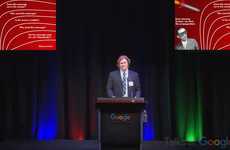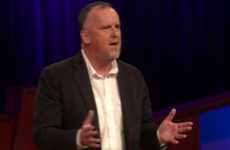
Need Inspiration?
Get inspired by 4,000+ keynote speaker videos & our founder, a top keynote speaker on innovation.
Andrew Marantz Discusses Internet Trolls & How to End Fake News
Grace Mahas — November 1, 2019 — Keynote Trends
Andrew Marantz, a journalist from 'The New Yorker,' gave a speech about the real world of internet trolls who disseminate fake news for political gain. He states that blatantly false information, aka fake news, has become extremely normalized and almost mainstream. To gain insight on this phenomenon, Marantz interviewed real social media propagandists who propel fringe talking points filled with misinformation where he learned all these people needed was a computer or smartphone and acess to the internet.
One particular propagandist interviewed by Andrew Marantz inaccurately reported that a bomb in New York city was detonated by a person of Islamic faith and asked for the United States to ban immigration. In fact, the bomber was an American citizen and immigration was not the main issue. Marantz continues that the internet troll reporting this new this understood that immigration was not the problem, however, were motivated by either money, racial segregation, or furthering the patriarchy. According to Marantz, these propagandists were not all born with these views, they somehow "fall down the rabbit hole online" and become indoctrinated with false information in a cult-like fashion. He argues this community only grows larger and that society can no longer ignore its harsh repercussions.
The propagandists know "that facts do not drive conversation online" and that "emotion drives the conversation." Content that becomes viral needs to have a lot of engagement such as likes and comments, a term that scientists coined "high arousing content." Unfortunately, social media algorithms are programmed to propel high engagement content, which inadvertently spreads fake news, content where people comment to agree or disagree. He concludes by giving some suggestions on how we might make the internet less toxic including: being a smart skeptic, the limits and productivity of free speech, and being a decent human being. He also urges social networks to reprogram their algorithms to stop propelling fake news that actively harms the world.
One particular propagandist interviewed by Andrew Marantz inaccurately reported that a bomb in New York city was detonated by a person of Islamic faith and asked for the United States to ban immigration. In fact, the bomber was an American citizen and immigration was not the main issue. Marantz continues that the internet troll reporting this new this understood that immigration was not the problem, however, were motivated by either money, racial segregation, or furthering the patriarchy. According to Marantz, these propagandists were not all born with these views, they somehow "fall down the rabbit hole online" and become indoctrinated with false information in a cult-like fashion. He argues this community only grows larger and that society can no longer ignore its harsh repercussions.
The propagandists know "that facts do not drive conversation online" and that "emotion drives the conversation." Content that becomes viral needs to have a lot of engagement such as likes and comments, a term that scientists coined "high arousing content." Unfortunately, social media algorithms are programmed to propel high engagement content, which inadvertently spreads fake news, content where people comment to agree or disagree. He concludes by giving some suggestions on how we might make the internet less toxic including: being a smart skeptic, the limits and productivity of free speech, and being a decent human being. He also urges social networks to reprogram their algorithms to stop propelling fake news that actively harms the world.
5.3
Score
Popularity
Activity
Freshness
















